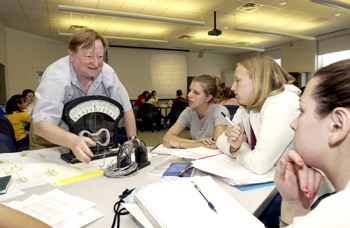|
10:50 a.m., May 7, 2003--Harry Shipman, Annie Jump Cannon Professor of Astronomy, has won national recognition for both his research and his teaching. Shipman has received a prestigious National Science Foundation (NSF) Director’s Award for Distinguished Teaching Scholars, the highest award presented to professors who excel at both undergraduate teaching and scholarship.
Shipman is one of six university and college faculty members nationwide selected for the award, NSF announced Thursday, May 1. Individual grants of $300,000, to be used over four years, will enable recipients to improve how science, technology, engineering and mathematics research translates into undergraduate instruction.
 |
| Harry Shipman demonstrates a principle of physics to students (from left) Kathryn Belczyk, CHEP 2004; Christie Buck, CHEP 2004; and Lauren D'Andrea, CHEP 2004. |
The award aims to encourage scholars to continue their dual efforts and to explore and experiment with ways to integrate research and education and also recognizes institutions of higher education that promote and commit resources to support faculty who effectively contribute to both their research discipline and education, according to NFS director Rita Colwell.
“Harry has a well-deserved reputation on campus as an excellent teacher,” UD President David Roselle wrote in a letter supporting Shipman’s application for the NSF award. “I continue to be impressed with his commitment to teaching, especially teaching introductory courses to large groups of nonscience majors.”
“This is very well deserved recognition of Harry Shipman’s extraordinary contributions,” Provost Dan Rich said.
The award honors Shipman for his research investigating white dwarf stars and, more recently, brown dwarf stars and as an innovative and creative science educator, who explores new methods of teaching science, especially to nonscience majors.
“It is a great honor,” Shipman said. It was an exceptionally memorable day for him when he received word of the award because he also was notified that he and his colleague, astronomer John Gizis, received three-orbits’ time on the Hubble Space Telescope to further study brown dwarf stars.
Shipman will be recognized officially at a ceremony at the National Academy of Sciences, June 3, in Washington, D.C., after meeting with members of Congress in the morning.
He said he plans to use the $300,000 grant over four years to carry out a proposal entitled “STARS—Science Teaching and Astronomy Research Synthesized.” Shipman wrote, “My commitment to both the scholarship of discovery and the scholarship of teaching frames this proposal.”
In the first part of his proposal, Shipman summarized his research on white dwarf stars, which are like our sun but in the final stages of their life cycles. His research resulted in the confirmation of a Nobel Prize-winning theory on the nature of these stars. He uses his and other current scientific research as a springboard for classroom teaching.
In his proposal, Shipman also discussed science education and the value of problem-based learning (PBL). He stated that “average Americans will need some scientific and technological sophistication in order to participate as citizens, workers and thinking human beings in the 21st century.”
Shipman’s goal is to “develop and publish an extensive set of hands-on student activities that will incorporate current science research into what students do, in collaborative groups in the classroom.” These activities will be directed to nonscience majors, and an important group of these students is future elementary teachers, Shipman said.
Two pivotal experiences opened new boundaries in teaching for Shipman—serving as faculty director of UD’s Center for Teaching Effectiveness and a 1994 sabbatical in the science education department of the University of Georgia. Both helped him to realize the potential of PBL and collaborative learning in the classroom as opposed to a lecture-only format, and Shipman has since been a leader in promoting teaching reform at UD. His teaching and research have earned him both the excellence-in-teaching and Francis Alison faculty awards on campus.
He said he also plans to work with a group of high school teachers and undergraduates during summers analyzing data gathered by a graduate student about PBL activities. “When teaching, I keep detailed records of class-tested activities--what works and what doesn’t and of student evaluations,” he said. The group’s findings will be disseminated through UD’s PBL electronic journal, the Clearinghouse, other science education journals and workshops.
Currently, Shipman is involved in team teaching the Science Semester for Elementary Teacher Education, an interdisciplinary course being offered for the first time. “It’s like riding on the back of a tiger, but it is an exciting course to teach, and we all learn from each other,” he said.
One hands-on activity involved a student overnight voyage on the RV Cape Henlopen. While some students were studying the salinity of the Delaware Bay on the ship (and learning about motion sickness because the bay was unusually rough that week), he said, others on campus were learning about motion science, studying the boat’s position and other factors and using nautical charts of the bay.
While Shipman is primarily involved in college-level teaching, he is interested in forming a “community of science teachers” from pre-school through college. To this end, he and colleagues at Delaware Technical and Community College have given talks on simple scientific activities for young children to inner-city day-care workers. He also has developed with others an energy curriculum for eighth graders.
When Shipman isn’t hobnobbing with stars and students, look for him at UD’s Ice Arena, where he is a proud member of the Delaware Dazzle, an adult synchronized skating team, and is faculty adviser to the student ice skating team, the Precisionaires.
A member of UD’s faculty since 1975, Shipman is a graduate of Harvard University and received his master’s and doctoral degrees from the California Institute of Technology.
Article by Sue Moncure
Photos by Kathy F. Atkinson
|

